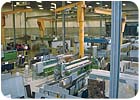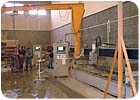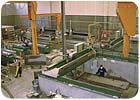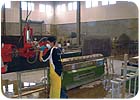
Plan-It Granite & Marble (PGM) operates out of two locations, including a 60,000-square-foot facility in Sterling, VA, and a 35,000-square-foot facility in Itasca, IL. Both locations are equipped with a vast amount of high-end technology from Marmo Meccanica, enabling the company to produce an average of 35 to 45 kitchens per day.
Operating out of two locations in Virginia and Illinois, Plan-It Granite & Marble relies on a vast amount of machinery for high-quality production
Plan-It Granite & Marble (PGM) operates out of two locations, including a 60,000-square-foot facility in Sterling, VA, and a 35,000-square-foot facility in Itasca, IL. Working with granite, marble and engineered stone, PGM's production is comprised mainly of countertop fabrication, and it also does work for the commercial market, including exterior facades.

The company's Virginia-based location houses two CTEC CNC stoneworking centers from Marmo Meccanica, and the Illinois location is equipped with one as well.

In total, the company operates five HTO-1B fully automatic bridge saws, also from Marmo Meccanica.

PGM's shops also house a total of five LCV 711M flat edge polishing machines.

Air vacuum-powered slab lifters help move slabs around the facility.
PGM's most recent investment is the development of a new integrated software package, which is custom built to the company's specifications and needs. Nix said it will “fully automate production lines and inventory, as well as, play an important role with scheduling, expediting and accounting.â€
The company currently fabricates an average of 1,500 to 2,000 square feet a day between its two locations -- which is equivalent to 35 to 45 kitchens. Furthermore, PGM fabricates full slabs only.
According to Nix, half of PGM's customer base is for new home construction, ranging from the largest national builder to the most detailed custom builder. The company also does some commercial work, including condominium conversions and exterior finishes, as well as work for kitchen and bath shops, general contractors and end-use customers.

The Virginia location also relies on overhead cranes for material handling, and they were purchased along with jib cranes primarily for safety reasons.
“In terms of our installers, each employee is started as a helper,†he continued. “Only after they have mastered their skills can they become a lead installer, and all lead installers are hired from within.â€
PGM's training begins with safety, according to Nix, who said that safety equipment is provided for every employee and required to be worn at all times. “Our biggest concern is the handling of material,†said Nix, adding that all employees must have a clear understanding of the dangers of granite. “In fact, we have retained the services of an outside firm which gives us weekly surprise visits to critique our operation and to give us advice on how best to ensure the safety of everyone.â€

In August 2005, PGM of Virginia designed and built its current 60,000-square-foot facility.
PGM brings in about six to eight containers a month. “We find that buying direct allows us to operate at the capacity our customers have demanded, as well as maintain a fixed cost to ongoing projects,†said Nix. “All of our local distributors play an important role in our daily purchases as well.â€
According to Nix, the greatest challenge for reputable fabricators today is to separate one's self from the rest. “Fortunately for PGM, we have maintained a large customer base by doing what we say we will and standing behind our product,†he said, adding that PGM also prides itself on producing a quality product with excellent turnaround time and customer service. “That has gotten us to where we are today and that will carry us on in the future.
“We maintain good relationships with our tool, equipment and slab suppliers as well as other fabricators,†he continued. “In doing so, we feel we can keep our fingers on the pulse of the industry.â€
Plan-It Granite & Marble
Sterling, VA and Itasca, ILType of work: countertops, some commercial work, exterior facades
Machinery: Itasca, IL -- Marmo Meccanica machinery, including two HTO1B bridge saws, two LCT 522 vertical polishing machines, two LCV 711 flat edge polishing machines, and a CTEC CNC stoneworking center. Sterling, VA -- three HTO1B bridge saws, three LCT 522 vertical edge polishers, three LCV 711 flat edge polishing machines, two CTEC CNC stoneworking centers, two overhead cranes, six jib cranes, plus other various polishing, dust collection and water recovery machines
Number of Employees: 108 between both locations
Production Rate: 35 to 45 kitchens a day between both locations